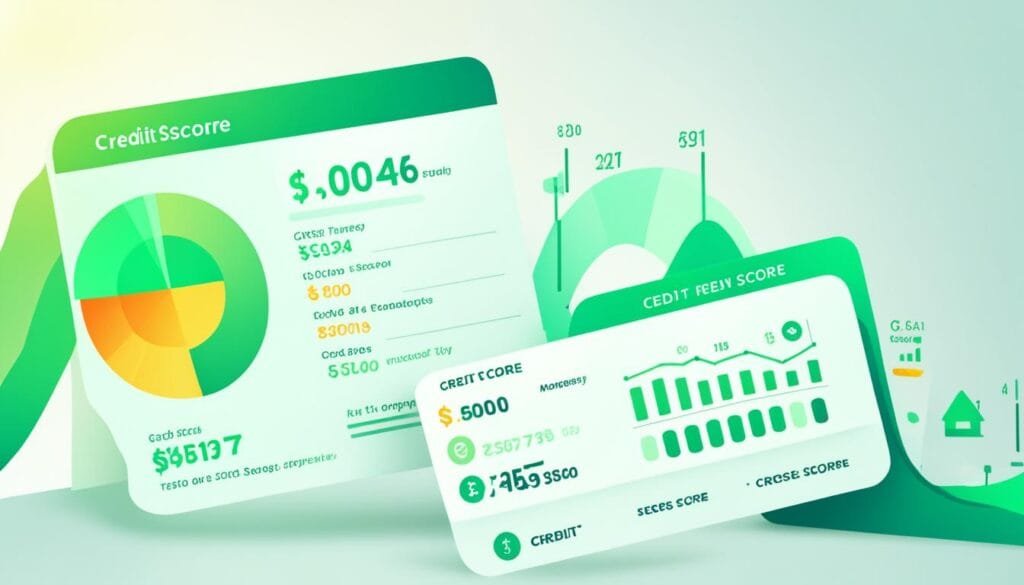Welcome to the Guide to Responsible Credit Usage Tips & Tricks, where we will explore strategies for effectively managing your credit cards and making responsible borrowing decisions. Maintaining a healthy financial life is crucial, and responsible credit usage plays a significant role in achieving this goal. By following the tips and tricks outlined in this guide, you can improve your credit score, avoid excessive credit card debt, and make smart financial decisions.
Key Takeaways:
- Responsible credit usage is essential for maintaining a healthy financial life.
- By managing your credit cards effectively, you can improve your credit score.
- Consistent, on-time payments and responsible credit utilization can lead to a better credit rating.
- Credit cards offer benefits such as rewards programs and 0% interest rates.
- Tips for responsible credit card usage include paying bills in full, budgeting, and keeping your credit utilization ratio low.
Benefits of Responsible Credit Card Usage
Using a credit card responsibly can provide numerous benefits. By making consistent, on-time payments and keeping your credit spending under control, you can improve your credit rating. Additionally, many credit cards offer rewards programs that allow you to earn cash, airline miles, or retail points for your purchases. Some cards even provide a 0% interest rate for a limited time on balance transfers from other credit cards.
“Using a credit card responsibly can have a positive impact on your financial well-being. By paying your bills on time and keeping your credit utilization low, you can gradually improve your credit score,” says Sarah Thompson, a financial expert.
Responsible credit usage not only helps you build a good credit history but also allows you to take advantage of various rewards and benefits offered by credit card companies. Let’s take a closer look at some of these benefits:
Earning Rewards
Many credit cards come with rewards programs that offer cashback, airline miles, or retail points for your purchases. By using your credit card responsibly, you can take full advantage of these rewards and earn valuable benefits for your spending. Whether it’s getting cashback on everyday purchases or accumulating points for a dream vacation, responsible credit card usage opens up a world of rewards and perks.
Improving Your Credit Rating
One of the most significant benefits of responsible credit card usage is the potential to improve your credit rating. By making consistent, on-time payments and keeping your credit utilization low, you demonstrate to lenders that you can manage credit responsibly. This, in turn, can lead to better interest rates and terms on future loans, such as mortgages or car loans.
0% Interest Rate Offers
Some credit cards provide introductory 0% interest rate offers for a limited time on balance transfers from other credit cards. This can be an excellent opportunity to consolidate your credit card debt onto one card and save on interest charges. By responsibly managing your credit card usage and taking advantage of these promotional offers, you can potentially reduce your debt more efficiently.
Remember, responsible credit usage is key to reaping the full benefits of your credit card. By paying your bills on time, keeping your spending in check, and using credit wisely, you can unlock rewards, improve your credit rating, and potentially save on interest charges.
The table below provides an overview of the benefits of responsible credit card usage:
| Benefits | Description |
|---|---|
| Earning Rewards | Many credit cards offer rewards programs, allowing you to earn cashback, airline miles, or retail points for your purchases. |
| Improving Credit Rating | Responsible credit card usage can lead to an improved credit rating, resulting in better loan terms and interest rates. |
| 0% Interest Rate Offers | Some credit cards provide introductory 0% interest rate offers for balance transfers, allowing you to save on interest charges. |
Tips for Responsible Credit Card Usage
To effectively use a credit card, it’s essential to follow some key tips. By implementing these strategies, you can avoid unnecessary charges, maintain a good payment history, and improve your overall credit score.
Avoiding Interest Charges
To avoid paying interest on your credit card purchases, make it a practice to pay the full balance each billing cycle. By doing so, you can save money and prevent debt from accumulating. It’s crucial to be mindful of your spending and ensure that you have enough funds to cover your credit card expenses.
Paying Bills in Full
Make a habit of paying your credit card bills in full every month, even if the minimum payment is all you can afford. This will help you maintain a good payment history, which is a key factor in determining your creditworthiness. By paying your bills on time and in full, you can avoid late fees and penalties, while also establishing a positive credit history.
Budgeting
Using your credit card as a budgeting tool can be beneficial, as it allows you to track your spending and stay within your financial limits. However, it’s essential to only charge what you can afford to pay back in full at the end of the billing cycle. This way, you can avoid accumulating unnecessary debt and ensure that your credit card usage aligns with your budget.
Credit Utilization Ratio
Maintaining a healthy credit utilization ratio is crucial for improving your credit score. This ratio represents the amount of credit you’re using compared to your total available credit. It’s recommended to keep your credit utilization below 30% to demonstrate responsible credit usage. For example, if your credit limit is $10,000, try to keep your balance below $3,000 to maintain a healthy credit utilization ratio.
Implementing these tips for responsible credit card usage can help you avoid interest charges, maintain good payment habits, budget effectively, and improve your credit score. By making informed decisions and staying disciplined in your credit card usage, you can achieve financial stability and set yourself up for long-term success.
| Tips for Responsible Credit Card Usage |
|---|
| Avoid paying interest charges |
| Pay your bills in full |
| Use your credit card as a budgeting tool |
| Maintain a healthy credit utilization ratio |
Building Credit Responsibly
Building credit is an important step towards achieving financial stability and securing favorable credit terms. By responsibly managing your credit, you can establish a positive credit history, improve your credit score, and gain access to a wider range of financial opportunities.
To build credit effectively, it’s crucial to follow a few key strategies:
- Make on-time payments: Consistently paying your bills and credit obligations on time demonstrates your reliability to lenders and positively impacts your credit history.
- Use credit wisely: It’s essential to use credit responsibly and avoid excessive debt. Only borrow what you need and can comfortably repay.
- Maintain a healthy mix of credit types: Having a diverse portfolio of credit types, such as credit cards, loans, and mortgages, demonstrates your ability to manage different financial responsibilities.
- Monitor your credit: Regularly reviewing your credit reports and scores can help you identify any errors or fraudulent activity and take necessary steps to address them.
- Keep low credit utilization: Aim to keep your credit utilization ratio, which is the amount of credit you’re using compared to your total available credit, below 30%. This shows lenders that you’re using credit responsibly and not relying too heavily on borrowed funds.
By following these guidelines, you can establish a solid credit foundation and work towards long-term credit score improvement. Remember, building credit takes time and patience, but the efforts you put in today will pay off in the future.
Example: Building Credit Responsibly
“I always make sure to pay my credit card bills on time and in full each month. It’s helped me build a strong credit history and improve my credit score over time. By using credit responsibly and keeping my credit utilization low, I’ve been able to qualify for better loan terms and access financial opportunities that were previously out of reach.”
– Sarah Johnson, Responsible Credit User
Credit Types Comparison
| Credit Type | Features | Benefits |
|---|---|---|
| Credit Cards |
|
|
| Loans |
|
|
| Mortgages |
|
|

Remember, responsible credit usage is key to building and maintaining a strong credit profile. By implementing these strategies, you can take control of your financial future, improve your credit score, and unlock a world of opportunities.
What Are Some Key Tips for Responsible Credit Usage?
When it comes to responsible credit usage tips, the key is to always pay your bills on time. Additionally, try to keep your credit card balances low and only apply for new credit when necessary. Monitoring your credit report regularly can also help you catch any errors or signs of identity theft early on.
Conclusion
Responsible credit usage plays a pivotal role in both managing credit cards and making smart financial decisions. By implementing the tips and tricks provided in this guide, you can effectively manage your credit card usage, improve your credit score, and make responsible borrowing decisions.
One vital aspect of responsible credit usage is ensuring that you consistently pay your bills on time. This not only helps you avoid late payment fees but also contributes to building a positive payment history, which is crucial for credit score improvement. Additionally, keeping your credit utilization ratio low is essential. By only utilizing a small portion of your available credit, you demonstrate to lenders that you are responsible with your credit, which can positively impact your credit score.
Furthermore, it is crucial to make smart credit decisions by spending only what you can afford. It is tempting to rely on credit cards for purchases, but it is important to remember that excessive credit card debt can have a detrimental impact on your financial health. By using credit cards responsibly and only charging what you know you can repay, you ensure that you are making sound financial choices and avoid the potential pitfalls of high-interest rates and fees.
In conclusion, by following the guidelines for responsible credit usage, you can take control of your credit card management, improve your credit score, and make wise financial decisions. Remember, responsible credit usage is not just about managing credit cards, it is about adopting a mindful and disciplined approach to your overall financial well-being.
FAQ
What is responsible credit usage?
Responsible credit usage refers to using credit cards and other forms of credit responsibly and prudently. It involves making timely payments, keeping credit card balances under control, and using credit wisely to improve credit scores and maintain a healthy financial life.
How can responsible credit card usage benefit me?
Responsible credit card usage can benefit you in several ways. It helps improve your credit rating, which is crucial for obtaining favorable credit terms in the future. Additionally, many credit cards offer rewards programs that allow you to earn cash, airline miles, or retail points for your purchases. Some cards also provide 0% interest rates for balance transfers from other credit cards.
What are some tips for responsible credit card usage?
Here are some essential tips for responsible credit card usage: – Pay your credit card balance in full each billing cycle to avoid paying interest. – Make it a habit to pay your credit card bills in full every month, even if you can only afford the minimum payment. – Use your credit card as a budgeting tool and charge only what you can afford. – Keep your credit utilization ratio below 30% by keeping your balance below 30% of your total available credit.
How can I build credit responsibly?
Building credit responsibly involves making on-time payments, using credit wisely, and maintaining a healthy mix of credit types. By consistently following these practices, you can establish a positive credit history and improve your credit score over time. This will make you a more attractive borrower to lenders.
What are the key takeaways for responsible credit usage?
The key takeaways for responsible credit usage include paying bills on time, keeping your credit utilization ratio low, and spending only what you can afford. By following these practices, you can effectively manage your credit card usage, improve your credit score, and make responsible borrowing decisions for a healthy financial future.

